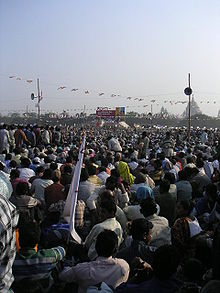Civil liberties
| Rights |
|---|
 |
| Theoretical distinctions |
| Human rights |
| Rights by beneficiary |
| Other groups of rights |
| Part of a series on |
| Discrimination |
|---|
 |
Civil liberties are guarantees and freedoms that governments commit not to abridge, either by constitution, legislation, or judicial interpretation, without due process. Though the scope of the term differs between countries, civil liberties may include the freedom of conscience, freedom of press, freedom of religion, freedom of expression, freedom of assembly, the right to security and liberty, freedom of speech, the right to privacy, the right to equal treatment under the law and due process, the right to a fair trial, and the right to life. Other civil liberties include the right to own property, the right to defend oneself, and the right to bodily integrity. Within the distinctions between civil liberties and other types of liberty, distinctions exist between positive liberty/positive rights and negative liberty/negative rights.
Overview

Many contemporary nations have a
The formal concept of civil liberties is often dated back to Magna Carta, an English legal charter agreed in 1215 which in turn was based on pre-existing documents, namely the Charter of Liberties.[4]
Asia
China
The Constitution of the People's Republic of China (which applies only to mainland China, not to Hong Kong, Macau, and Taiwan) especially its Fundamental Rights and Duties of Citizens, claims to protect many civil liberties. Taiwan, which is separated from Mainland China, has its own Constitution.
Although the 1982 constitution guarantees civil liberties,[5] the Chinese government usually uses the "subversion of state power" and "protection of state secrets" clauses in their law system to imprison those who criticize the Chinese Communist Party (CCP) and the state leaders.[6]
India
The Fundamental Rights – embodied in Part III of the constitution – guarantee liberties such that all Indians can lead their lives in peace as citizens of India. The six fundamental rights are right to equality, right to freedom, right against exploitation, right to freedom of religion, cultural and educational rights and right to constitutional remedies.[7]

These include individual rights common to most
All people, irrespective of race, religion, caste or sex, have the right to approach the
The Fundamental Rights emphasize equality by guaranteeing to all citizens the access and use of public institutions and protections, irrespective of their background. The rights to life and personal liberty apply to persons of any nationality, while others, such as the freedom of speech and expression are applicable only to the
Fundamental Rights primarily protect individuals from any arbitrary State actions, but some rights are enforceable against private individuals too.
Japan
Since 1947,
Despite the adoption of this liberal constitution, often referred as the "Postwar Constitution" (戦後憲法, Sengo-Kenpō) or the "Peace Constitution" (平和憲法, Heiwa-Kenpō), the Japanese governing elites have struggled to usher in an inclusive, open and
The first Japanese attempt to a bill of rights was in the 19th century
People tend to view the bill of rights as a moral imperative and not as a judicial norm. The people also tend to rely upon bureaucrats to remedy social problems, including even human rights violations, rather than the court.
— Shigenori Matsui, "The protection of 'Fundamental human rights' in Japan."[25]
Despite the divergences between Japan's social culture and the
On its official site, the Japanese government has identified various human rights problems. Among these are child abuses (e.g.,
Human rights organizations, national and foreign, expand the list to include human rights violations that relate to government policies, as in the case of
Australia
Whilst Australia does not have an enshrined Bill of Rights or similar binding legal document, civil liberties are assumed as protected through a series of rules and conventions. Australia had primary involvement in and was a key signatory to the UN Universal Declaration on Human Rights (1948)
The Constitution of Australia (1900) does offer very limited protection of rights:
- the right to freedom of religion and;
- the right to freedom from discrimination based on out-of-state residence (historical prejudice based upon residence within one state affecting treatment within another)
Certain High Court interpretations of the Constitution have allowed for implied rights such as freedom of political communication (which is construed broadly) and the right to vote to be established, however others such as freedom of assembly and freedom of association are yet to be identified.
Refugee issues
Within the past decade Australia has experienced increasing contention regarding its treatment of those seeking asylum. Although Australia is a signatory to the UN Refugee Convention (1951), successive governments have demonstrated an increasing tightening of borders; particularly against those who seek passage via small water vessels.
The Abbott Government (2013) like its predecessors (the Gillard and Howard Governments) has encountered particular difficulty curbing asylum seekers via sea, increasingly identified as "illegal immigration". The recent involvement of the Australian Navy in refugee rescue operations has many human rights groups such as Amnesty International concerned over the "militarisation" of treatment to the refugee and the issue of their human rights in Australia. The current "turn-back" policy is particularly divisive, as it involves placing refugees in government lifeboats and turning them towards Indonesia. Despite opposition however, the Abbott government's response has so far seen a reduction in the number of potential refugees undertaking the hazardous cross to Australia, which is argued by the government as an indicator for its policy success.
Europe
European Convention on Human Rights
The European Convention on Human Rights, to which almost all European countries belong (apart from Belarus), enumerates a number of civil liberties and is of varying constitutional force in different European states.
Czech Republic
Following the
France
France's 1789 Declaration of the Rights of Man and of the Citizen listed many civil liberties and is of constitutional force.
Germany
The
United Kingdom
Civil liberties in the
In June 2008 the then Shadow Home Secretary
Russia
The
North America
Canada
The Constitution of Canada includes the Canadian Charter of Rights and Freedoms which guarantees many of the same rights as the U.S. constitution. The Charter omits any mention of, or protection for, property.
Mexico
The
United States
The
The Civil Liberties Act of 1988 was signed into effect by President Ronald Reagan on August 10, 1988. The act was passed by Congress to issue a public apology for those of Japanese ancestry who lost their property and liberty due to discriminatory actions by the United States Government during the internment period. This act also provided many other benefits within various sectors of the government. Within the treasury it established a civil liberties public education fund. It directed the Attorney General to identify and locate each individual affected by this act and to pay them $20,000 from the civil liberties public education fund. It also established a board of directors who is responsible for making disbursements from this fund. Finally, it required that all documents and records that are created or received by the commission be kept by the Archivist of the United States.[35]
See also
- American Civil Liberties Union
- Canadian Civil Liberties Association
- Civil and political rights
- Civil libertarianism
- Drug liberalization
- Equality and Human Rights Commission
- Fundamental freedoms
- Human rights
- Libertarianism
- Liberalism
- Liberty (pressure group)
- List of civil rights leaders
- Privacy
- Proactive policing
- Rule according to higher law
- Rutherford Institute
- Teaching for social justice
- State of World Liberty Index
- Statewatch
Notes and references
- ^ Ghappour, Ahmed (2017-09-01). "Data Collection and the Regulatory State". Connecticut Law Review. 49 (5): 1733.
- S2CID 110482777.
- ^ Fog, Agner (2017). Warlike and Peaceful Societies: The Interaction of Genes and Culture. Open Book Publishers.
- ^ Hugh Starkey. "Magna Carta - Human rights legislation". British Library. Archived from the original on 22 November 2016. Retrieved 22 November 2016.
- ^ "Constitution of the People's Republic of China". People's Daily Online. Archived from the original on Oct 6, 2014. Retrieved 5 March 2015.
- ^ Buckley, Chris (3 April 2008). "China jails rights activist outspoken on Tibet". Reuters. Archived from the original on Apr 11, 2023.
- ^ Constitution of India-Part III Fundamental Rights.
- public interest litigationwas introduced (date of ruling 15 December 1995).
- ^ Tayal, B.B. & Jacob, A. (2005), Indian History, World Developments and Civics, p. A-25
- ^ "Citizenship (Amendment) Bill, 2003" (PDF). Rajya Sabha. p. 5. Archived from the original (PDF) on 2006-04-25. Retrieved 2006-05-25.
- ^ "Bodhisattwa Gautam vs. Subhra Chakraborty; 1995 ICHRL 69". [World Legal Information Institute]. Retrieved 2006-05-25. This was the case where Fundamental Rights were enforced against private individuals (date of ruling 15 December 1995).
- Kesavananda Bharati vs. state of Kerala; AIR 1973 S.C. 1461, (1973) 4 SCC 225 – In what became famously known as the "Fundamental Rights case", the Supreme Courtdecided that the basic structure of the constitution was unamendable.
- ^ Tayal, B.B. & Jacob, A. (2005), Indian History, World Developments and Civics, p. A-24
- ISBN 978-1576072714.
- SSRN 2270399.
- ^ Yokota, Yozo, & Chiyuki Aoi (2000). "Japan's foreign policy towards human rights: uncertain changes" (PDF). Human Rights and Comparative Foreign Policy: Foundations of Peace, Edited by David Forsythe. United Nations University Press: Chapter 5. Archived (PDF) from the original on 2022-10-09.
{{cite journal}}: CS1 maint: multiple names: authors list (link) - ISBN 978-1107014077.
- ^ "Japan veering away from global human rights standards, says Amnesty International". The Japan Times. Kyodo News. February 25, 2015. Retrieved July 5, 2016.
- ^ Suzanne Trimel (July 25, 2014). "UN Urges End to Discrimination Against LGBT Individuals in Japan". Analysis. Outright International. Retrieved July 5, 2016.
- ^ Osumi, Magdalena (June 26, 2015). "U.S. rights report slams Japan on child abuse, prison conditions, asylum system". News report. Japan Times. Retrieved July 5, 2016.
- ^ Kazuhiro Takii and David Noble, The Meiji Constitution: The Japanese Experience of the West and the Shaping of the Modern State (Tokyo, Japan: International House of Japan, 2007), 181.
- ^ Andrew Gordon, Postwar Japan As History. Berkeley: University of California Press, 1993, p. 91.
- ISBN 978-1400871667. Retrieved July 5, 2016.
- ^ Ugo Dessì, Japanese Religions and Globalization. London: Routledge, 2013, p. 64.
- ^ “The protection of ‘Fundamental human rights’ in Japan,” a chapter in Human Rights in Asia: A Comparative Legal Study of Twelve Asian Jurisdictions, France and the USA, edited by Peerenboom, R. P., Carole Petersen, and Hongyi Chen (London: Routledge, 2006), 149
- ^ "Japan and South Korea agree WW2 'comfort women' deal". BBC. December 28, 2015. Retrieved July 5, 2016.
- ^ Sanghani, Radhika (December 29, 2015). "The horrific story of Korea's 'comfort women' – forced to be sex slaves during World War Two". Telegraph. London. Archived from the original on 2022-01-12. Retrieved July 5, 2016.
- ^ Government of Japan (March 6, 2009). "Major Human Rights Problems". Human Rights Bureau. Ministry of Justice, Japan. Archived from the original on April 23, 2018. Retrieved July 5, 2016.
- ^ Jeffrey Flynn, Reframing the Intercultural Dialogue on Human Rights: A Philosophical Approach (London: Routledge, 2014), 114.
- ^ Wanklyn, Alastair (April 14, 2016). "Japan human rights improve but problems persist: U.S. State Department". Japan Times. Retrieved July 5, 2016.
- ^ "Putin rolling back civil rights, warns Amnesty". the Guardian. February 27, 2008.
- ^ "Constitución reordenada y consolidada". Archived from the original on 2017-11-06. Retrieved 2023-06-27.
- ^ America's Constitution: A Biography by Akhil Reed Amar
- ^ Robert J. McCarthy, "Civil Rights in Tribal Courts; The Indian Bill of Rights at 30 Years", 34 Idaho Law Review 465 (1998).
- ^ Foley, Thomas (1988). "Civil Liberties Act of 1987 – Conference Report". Congress.gov. Retrieved 2015-06-18.
Further reading
- Chronicle of Higher Education, Chronicle Review, September 28, 2001. Accessed August 11, 2006.
- Smith, Jean Edward, and Herbert M. Levine. Civil Liberties and Civil Rights Debated. Englewood Cliffs, NJ: Prentice Hall, 1988.
